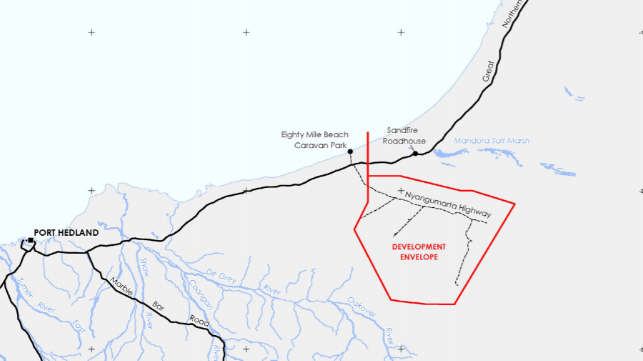Australia Accelerates Gigantic Green Hydrogen Export Project

The government of Australia has granted "major project status" to the proposed Asian Renewable Energy Hub (AREH), a massive green electricity-to-hydrogen project in Western Australia's Pilbara region. If constructed, the 2,500-square-mile, 26 gigawatt, $36 billion solar and wind farm would be the largest powerplant of any kind in the world.
Its primary objective is not to produce electricity for the grid: instead, its output would be used to make green hydrogen via electrolysis. The hydrogen would be combined with atmospheric nitrogen to make ammonia, which would be exported for use as a fertilizer and (according to its developers) as a marine fuel.
“The Asian Renewable Energy Hub has the potential to transform the East Pilbara and neighbouring Broome shire and to contribute to a major new export industry for Australia,” said Australian Minister for Industry Karen Andrews in a statement Friday. “Not only will the plant be able to export at scale, it will also be able to supply industries in the region while creating new job opportunities and economic growth.”
About 10 percent of the facility's power would go towards supplying the needs of large industrial users in Pilbara, including mining interests. The balance would be used for large-scale production of green hydrogen and ammonia for export.
The project has been in development since 2014, led by a consortium including investment firm Macquarie, wind turbine maker Vestas, developer Intercontinental Energy and energy trading firm CWP Energy Asia. It sits on the coastal margin of Western Australia's vast Great Sandy Desert, about 150 miles to the east of the iron ore export hub of Port Hedland.
Last week, AREH received an environmental approval from the state of Western Australia for its first phase, along with a "major project" designation from the national government. This means that AREH now has recognition as a development of "strategic significance," along with support from the Major Projects Facilitation Agency; a single entry point for national-level permit approvals; and government-facilitated coordination with state and territory approvals.

that matters most
Get the latest maritime news delivered to your inbox daily.
“It sends a strong signal to everyone involved, including potential customers and investors, that our project is at the forefront of an emerging green hydrogen industry for Australia, and the opening of a massive new export market to the fast-growing Asian economies to our north,” said AREH Project Director Brendan Hammond.
A final investment decision is expected in 2025 with construction beginning the year after. First product exports would begin in 2027-28.
